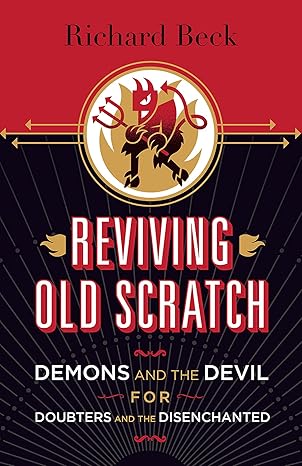Tonight, we will discuss Chapter 5, “Holy Ghost Conga Line,” and Chapter 6, “The Wizard of Oz,” of Richard Beck’s book Reviving Old Scratch: Demons and the Devil for Doubters and the Disenchanted. In Chapter 6, Beck expands on his observation from Chapter 1 that a robust understanding of spiritual warfare enables us to hate injustice while loving everyone. Please remember to come a little early for the Café Ole Vienna food truck.
The Twitter Mob: (pp.57-59)
Beck begins this chapter with a story of a Twitter mob in 2014 who, within the space of a few hours, managed to take a Tweet and have the original poster fired from her job for being “racist.” (In Beck’s understanding, the original poster simply made a poorly worded joke directed at her self-understanding as a privileged white American on her way to Africa.) The Twitter mob that retweeted and ganged up on the original poster was full of self-righteousness. They wanted to make the world a better place, governed by less cruelty and insensitivity. The mob, however, became what it despised. Beck published his book in 2016, but we can see the reaction against these types of social media lynchings continuing and corrupting our political discourse to this day.
A Call to Love: (pp.59-60)
The problem that Beck diagnoses is that we should and do become angry about injustice in the world. We should be angry about racism, cruelty, and indifference to suffering. When we read through the Hebrew prophets, we see a God who is also angry about these things. (If you have time today, please review our discussion of Abraham Heschel’s writing on God’s Wrath HERE and HERE.) Indifference to evil is evil. Being quiet in the face of evil is acquiescence. Like the Twitter mob, we should have a deep-seated need to react, speak out, and oppose evil within our society.
But, as Christians, we are called to love our neighbors as ourselves. Jesus commands us to love our enemies and pray for those who persecute us. In his own actions, we see Jesus loving the Roman centurion, the Jewish tax collectors who worked for the Roman Empire, Samaritans who rejected him, and all other sorts of immoral, anti-social people. As Paul writes in 1 Corinthians 13, love means being patient and kind, neither arrogant nor rude, and neither irritable nor resentful. This is how we must be towards everyone.
The question for Beck is, how do we square the circle? How can we both oppose those who do evil and love those who do evil? How can we speak up like a Twitter mob but also love like Jesus?
Rage, Love, and the Wizard: (pp.60-66)
The answer to threading the needle between the Scylla and Charybdis of rage and love is the Wizard of Oz. Beck urges us to understand the power behind the evil that we see and experience. We should see the Wizard behind the curtain. Beck gives us the example of Nazism of a Wizard that takes over an entire populous. Both the oppressed and the oppressors are victims of the Wizard.
Therefore, our goal, Beck writes, is not to score political points or even win the political arguments. (Laws cannot make people moral.) Rather, our goal is “liberating human beings from their slavery to this spiritual power.” p.65. A righteous Twitter mob easily becomes a tool for evil when our target is another human being. Spiritual warfare against the Wizard behind the curtain can both energize our anger toward the evil in the world and lovingly redirect it away from other people and toward our common enemy. Beck points out that Jesus had mercy on those who murdered him because he saw who they were being controlled by.
Think through Beck’s argument. I believe he has a great deal to offer all of us in the current political climate.
Please come around 5:45 on Tuesday. We are having an Austrian feast with the Café Old Vienna’s food truck. Discussion around 6:45. Compline about 8. Hope to see you here.
Unless we look at a person and see the beauty there is in this person, we can contribute nothing to him. One does not help a person by discerning what is wrong, ugly, and distorted. Christ looked at everyone he met and saw the beauty hidden therein. And what he did was to call out that beauty. Metropolitan Anthony of Sourozh (1914-2003)


Pingback: Reviving Old Scratch – I Love Humanity, It’s People I Can’t Stand – Ancient Anglican